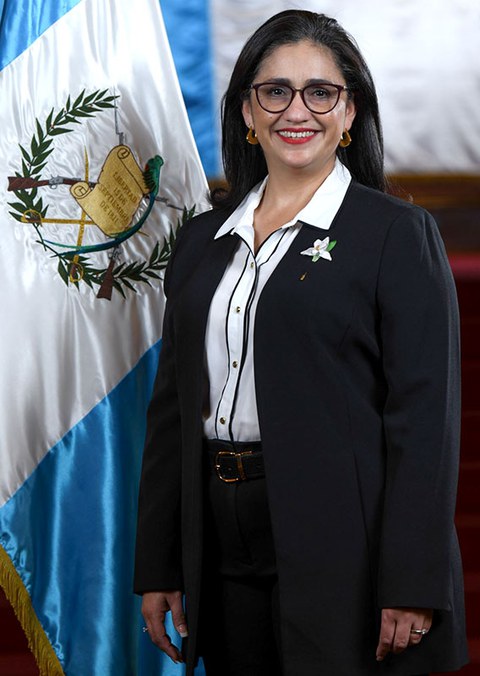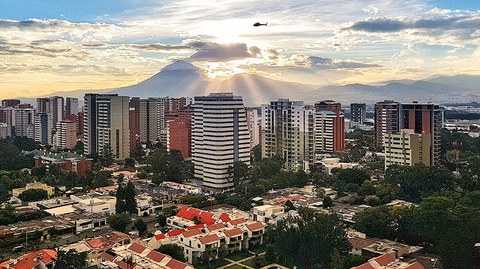“The CIPSEM team is the icing on the cake”
Dagmar Möbius
Dr. Maria Jose Iturbide-Flores has been the Minister of Environment and Natural Resources of Guatemala since January 2024. In the autumn of 2023, the biologist successfully completed the 88th International UNEP/UNESCO/BMUV short course on nature-based solutions to water challenges at TUD. KONTAKT spoke to her.
Please tell us about your professional career.

Dr. Maria Jose Iturbide-Flores was Guatemala's Minister of Environment and Natural Resources till April 2024.
I have a Master's degree in Environmental Studies and a PhD in Environmental Policy and Planning, complementing my background as a biologist. I bring a wealth of experience to the table, with more than 25 years of commitment to and expertise in environmental policy and planning, conserving biodiversity, natural resource management, wildlife conservation, administration, as well as responsible corporate and team leadership. As an accomplished international environmental negotiator, I have successfully contributed to multilateral negotiations regarding environmental treaties, freshwater and biodiversity management, corporate environmental management and implementing strategic plans, including effective fundraising.
All around the world, I am active in pioneering initiatives and projects that emphasize natural resource management and ecological sustainability. I was recently appointed a volunteer member of the UNWater Strategic Advisory Group (SAG) and certified as a Corporate Water Specialist by the Alliance Water Stewardship (AWS). I am fluent in English and Spanish and work with businesses and communities in over 40 cities in 35 countries on five continents.
Which CIPSEM course did you attend? How did you hear about it?
In October 2023, I completed a course on "Nature-based solutions to new water problems" at CIPSEM at TU Dresden. It was rewarding, not only because the contents were very interesting, but also because of the exchange of information about the experiences of the other 20 participants from developing countries who attended the same course. The speakers, too, were high-level researchers and experts, and the excursions complemented the three-week course.
What exactly do you do today and what are your tasks?
Throughout my tenure as Minister of Environment and Natural Resources for the Republic of Guatemala till April 2024, I led the charge in the non-extension of Government Agreement 236-2006, a pivotal move in the implementation of Wastewater Technical Studies (ETAR) for all municipalities in the country. This landmark decision was a beacon of hope, addressing the urgent need to restore our rivers, as the agreement had been extended for over 18 years. Furthermore, I initiated the formation of Technical Tables to facilitate the effective implementation of Government Agreement 164-2021, which focuses on the Comprehensive Management of Waste and Solid Waste.
Furthermore, I fostered the establishment of the Coalition for the Motagua River, a collaborative platform involving over 120 stakeholders from diverse national and international initiatives. I successfully reactivated and restructured the National Climate Change Council into more efficient technical work tables. Lastly, I took decisive action against environmental offenses by filing more than 15 criminal complaints for unauthorized sand extraction activities, false ecological licenses, and administrative irregularities across several departmental delegations of the Ministry.
What do you remember most fondly when you think about your time in Dresden?
We went on field trips and, together with friends, explored Dresden and Berlin. It was always an adventure to try and understand how trains and trams worked, and where to get off.
Is there anything else you would like to tell us?
CIPSEM provides access to first-class postgraduate courses with a focus on environmental management and sustainability. Participants will gain knowledge, skills and expertise that are essential for tackling environmental issues in their home countries.

The capital Guatemala City is surrounded by volcanoes.
In specialized training workshops, seminars, and courses, CIPSEM improves the ability of experts from developing countries to effectively manage environmental resources, implement sustainable practices, and develop relevant policies and strategies. In addition, it provides opportunities for networking with experts and researchers worldwide. This enables participants to make valuable contacts, exchange experiences, and work together on projects and initiatives to promote sustainable development in their countries.
Participants will have access to the most modern facilities, research laboratories and resources of TU Dresden. They will also gain insight into cutting-edge research, tools and technologies that they can use to tackle environmental problems in their countries.
I know for a fact that graduates of the CIPSEM programs receive internationally recognized qualifications, increasing our credibility and competitiveness in the labor market. These programs open up opportunities for career advancement and leadership roles in environmental management.
Overall, CIPSEM at TU Dresden is of crucial significance in enabling experts from developing countries to become influential leaders and agents of change in environmental management, thereby contributing to global efforts towards a more sustainable future. The CIPSEM team is the icing on the cake.
Contact:
Dr. María José Iturbide-Chang, MSc
Mobile: +(502) 57088947
skype: majoiturbide
Facts
Guatemala has 18.1 million inhabitants (2023), making it the most populous country in Central America. It is characterized by a diverse population, including indigenous groups. In addition to the official language Spanish, 22 Mayan languages are spoken. The indigenous population is seriously underrepresented in politics, state institutions and the economy, but has for the first time become active in a united manner in the sabotage attempts against the recent election results (strikes, blockades).
(Source: Federal Foreign Office)
